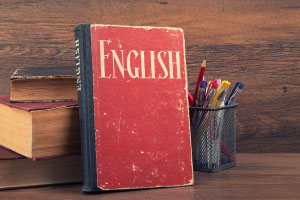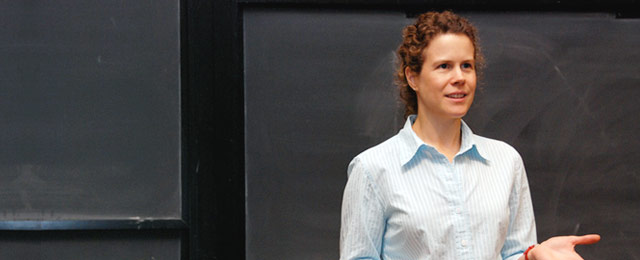Online courses directory (217)
This course is an examination of the formal structural and textual variety in poetry. Students engage in extensive practice in the making of poems and the analysis of both students' manuscripts and 20th-century poetry. The course attempts to make relevant the traditional elements of poetry and their contemporary alternatives. There are weekly writing assignments, including some exercises in prosody.
Great managers are made, not born. Learn about the qualities and skills of great managers in this Business 101 course. Instructor Sherri Hartzell holds both an MBA and Ed.D., so she's an excellent choice to teach you about principles of management.
Start by learning about the different levels of management in organizations and then dive into how good managers lead to great employees. Students of business, budding entrepreneurs and independent online learners alike can benefit from these short, engaging video lessons and interactive online quizzes. Business 101: Principles of Management can prepare you to earn real, widely transferable college credit by taking the Principles of Management CLEP exam or the Excelsior Principles of Management exam .
Sometime after 1492, the concept of the New World or America came into being, and this concept appeared differently - as an experience or an idea - for different people and in different places. This semester, we will read three groups of texts: first, participant accounts of contact between native Americans and French or English speaking Europeans, both in North America and in the Caribbean and Brazil; second, transformations of these documents into literary works by contemporaries; third, modern texts which take these earlier materials as a point of departure for rethinking the experience and aftermath of contact. The reading will allow us to compare perspectives across time and space, across the cultural geographies of religion, nation and ethnicity, and finally across a range of genres - reports, captivity narratives, essays, novels, poetry, drama, and film. Some of the earlier authors we will read are Michel Montaigne, William Shakespeare, Jean de Léry, Daniel Defoe and Mary Rowlandson; more recent authors include Derek Walcott, and J. M. Coetzee.
Lyrics Training is a Web application that allows you to read and listen to the lyrics from music videos and can be used as a fun and interactive way for language teachers and trainers to introduce new vocabulary and grammar to their students in a classroom setting. This free online language learning course will introduce you to the features and functionality of Lyrics Training, you will learn how to choose a song in the language you are learning and listen to the lyrics of the song word by word. Lyrics Training allows students to fill in the lyrics as they go along, and the difficulty level they choose decides how many words in a sentence are missing and they must fill in. This online language learning tool is particularly useful for students of foreign languages who want a fun and entertaining way to learn the correct pronunciation of words and it will improve their listening skills as students must identify words from a song. This free language learning course will be of great interest to all language teachers and trainers who would like to learn more about Web 2.0 applications that can greatly improve the learning experience of their students, and to all learners who would like to learn about using Lyrics Training for a fun way of learning a new language.<br />
In this class, you will read, think about, and (I hope) enjoy important examples of what has become one of the most popular literary genres today, if not the most popular: the novel. Some of the questions we will consider are: Why did so many novels appear in the eighteenth century? Why were they—and are they—called novels? Who wrote them? Who read them? Who narrates them? What are they likely to be about? Do they have distinctive characteristics? What is their relationship to the time and place in which they appeared? How have they changed over the years? And, most of all, why do we like to read them so much?
Great works of fiction often take us to far-off places; they sometimes conduct us on journeys toward a deeper understanding of what's right next door. We'll read, discuss, and interpret a range of short and short-ish works: The reading list will be chosen from among such texts as "Gilgamesh," Homer's Odyssey (excerpts), Bunyan's The Pilgrim's Progress (excerpts), Swift's Gulliver's Travels, Mary Shelley's Frankenstein, Conrad's Heart of Darkness, Saleh's Season of Migration to the North, Woolf's To the Lighthouse, John Cheever's "The Swimmer," Coetzee's The Life and Times of Michael K, Irving's "Rip Van Winkle," Toni Morrison's Jazz, H. G. Wells' The Time Machine, Twain's The Adventures of Huckleberry Finn, Beckett's How It Is, Calvino's Invisible Cities, Forster's A Passage to India. As a CI-H class, this subject will involve substantial practice in argumentative writing and oral communication.
This is a course focused on the literary genre of the essay, that wide-ranging, elastic, and currently very popular form that attracts not only nonfiction writers but also fiction writers, poets, scientists, physicians, and others to write in the form, and readers of every stripe to read it. Some say we are living in era in which the essay is enjoying a renaissance; certainly essays, both short and long, are at present easier to get published than are short stories or novels, and essays are featured regularly and prominently in the mainstream press (both magazines and newspapers) and on the New York Times bestseller books list. But the essay has a history, too, a long one, which goes back at least to the sixteenth-century French writer Montaigne, generally considered the progenitor of the form. It will be our task, and I hope our pleasure, to investigate the possibilities of the essay together this semester, both by reading and by writing.
This course analyzes major modern plays featuring works by Shaw, Pirandello, Beckett, Brecht, Williams, Soyinka, Hwang, Churchill, Wilson, Frayn, Stoppard, Deveare Smith, and Kushner. The class particularly considers performance, sociopolitical and aesthetic contexts, and the role of theater in the world of modern multimedia.
Introduction to Media Studies is designed for students who have grown up in a rapidly changing global multimedia environment and want to become more literate and critical consumers and producers of media. Through an interdisciplinary comparative and historical lens, the course defines "media" broadly as including oral, print, performance, photographic, broadcast, cinematic, and digital cultural forms and practices. The course looks at the nature of mediated communication, the functions of media, the history of transformations in media and the institutions that help define media's place in society. This year’s course will focus on issues of network culture and media convergence, addressing such subjects as Intellectual Property, peer2peer authoring, blogging, and game modification.
This course is a detailed investigation of the major issues and problems in the study of lexical argument structure and how it determines syntactic structure. Its empirical scope is along three dimensions: typology, lexical class, and theoretical framework. The range of linguistic types include English, Japanese, Navajo, and Warlpiri. Lexical classes include those of Levin's English Verb Classes and others producing emerging work on diverse languages. The theoretical emphasis of this course is on structural relations among elements of argument structure.
First-Year Composition 2.0 will help you to develop a better process and gain confidence in written, visual, and oral communication and to create and critique college-level documents and presentations.
What is the history of popular reading in the Western world? How does widespread access to print relate to distinctions between highbrow and lowbrow culture, between good taste and bad judgment, and between men and women readers? This course will introduce students to the broad history of popular reading and to controversies about taste and gender that have characterized its development. Our grounding in historical material will help make sense of our main focus: recent developments in the theory and practice of reading, including fan-fiction, Oprah's book club, comics, hypertext, mass-market romance fiction, mega-chain bookstores, and reader response theory.
This course focuses on phonological phenomena that are sensitive to morphological structure, including base-reduplicant identity, cyclicity, level ordering, derived environment effects, opaque rule interactions, and morpheme structure constraints. In the recent OT literature, it has been claimed that all of these phenomena can be analyzed with a single theoretical device: correspondence constraints, which regulate the similarity of lexically related forms (such as input and output, base and derivative, base and reduplicant).
This class explores the creation (and creativity) of the modern scientific and cultural world through study of western Europe in the 17th century, the age of Descartes and Newton, Shakespeare, Milton and Ford. It compares period thinking to present-day debates about the scientific method, art, religion, and society. This team-taught, interdisciplinary subject draws on a wide range of literary, dramatic, historical, and scientific texts and images, and involves theatrical experimentation as well as reading, writing, researching and conversing.
The primary theme of the class is to explore how England in the mid-seventeenth century became "a world turned upside down" by the new ideas and upheavals in religion, politics, and philosophy, ideas that would shape our modern world. Paying special attention to the "theatricality" of the new models and perspectives afforded by scientific experimentation, the class will read plays by Shakespeare, Tate, Brecht, Ford, Churchill, and Kushner, as well as primary and secondary texts from a wide range of disciplines. Students will also compose and perform in scenes based on that material.
The Diploma in English Language and Literature gives you the opportunity to gain comprehensive knowledge and understanding of important aspects of English language and literature. It is ideal for people who have always wanted to study English language and literature in greater detail, as well as learners who are studying English as a second language.<br /><br />The English language modules cover the fundamentals of grammar, effective speaking, and writing skills.<br /><br />The English literature modules analyze literature with an emphasis on renowned authors and poets, such as Samuel Taylor Coleridge, Arthur Miller and William Shakespeare.<br /><br />A qualification in this free online diploma course is the ideal way of demonstrating your proficiency in the English language.<br />
What is the history of popular reading in the Western world? How does widespread access to print relate to distinctions between highbrow and lowbrow culture, between good taste and bad judgment, and between men and women readers? This course will introduce students to the broad history of popular reading and to controversies about taste and gender that have characterized its development. Our grounding in historical material will help make sense of our main focus: recent developments in the theory and practice of reading, including fan-fiction, Oprah's book club, comics, hypertext, mass-market romance fiction, mega-chain bookstores, and reader response theory.
As we read broadly from throughout the vast chronological period that is "Homer to Dante," we will pepper our readings of individual ancient and medieval texts with broader questions like: what images, themes, and philosophical questions recur through the period; are there distinctly "classical" or "medieval" ways of depicting or addressing them; and what do terms like "Antiquity" or "the Middle Ages" even mean? (What are the Middle Ages in the "middle" of, for example?) Our texts will include adventure tales of travel and self-discovery (Homer's Odyssey and Dante's Inferno); courtroom dramas of vengeance and reconciliation (Aeschylus's Oresteia and the Icelandic Njáls saga); short poems of love and transformation (Ovid's Metamorphoses and the Lais of Marie de France); and epics of war, nation-construction, and empire (Homer's Iliad, Virgil's Aeneid, and the Anglo-Saxon Beowulf).
This course aims to introduce students to the rich diversity of human culture from antiquity to the early 17th century. In this course, we will explore human culture in its myriad expressions, focusing on the study of literary, religious and philosophical texts as ways of narrating, symbolizing, and commenting on all aspects of human social and material life. We will work comparatively, reading texts from various cultures: Mesopotamian, Greek, Judeo-Christian, Chinese, Indian, and Muslim. Throughout the semester, we will be asking questions like: How have different cultures imagined themselves? What are the rules that they draw up for human behavior? How do they represent the role of the individual in society? How do they imagine 'universal' concepts like love, family, duty? How have their writers and artists dealt with encounters with other cultures and other civilizations?
In "The American Novel Since 1945" students will study a wide range of works from 1945 to the present. The course traces the formal and thematic developments of the novel in this period, focusing on the relationship between writers and readers, the conditions of publishing, innovations in the novel's form, fiction's engagement with history, and the changing place of literature in American culture. The reading list includes works by Richard Wright, Flannery O'Connor, Vladimir Nabokov, Jack Kerouac, J. D. Salinger, Thomas Pynchon, John Barth, Maxine Hong Kingston, Toni Morrison, Marilynne Robinson, Cormac McCarthy, Philip Roth and Edward P. Jones. The course concludes with a contemporary novel chosen by the students in the class.
Tradition and innovation in representative fiction of the early modern period. Recurring themes include the role of the artist in the modern period; the representation of psychological and sexual experience; and the virtues (and defects) of the aggressively experimental character. Works by Conrad, Kipling, Babel, Kafka, James, Lawrence, Mann, Ford Madox Ford, Joyce, Woolf, Faulkner, and Nabokov.
Trusted paper writing service WriteMyPaper.Today will write the papers of any difficulty.




















